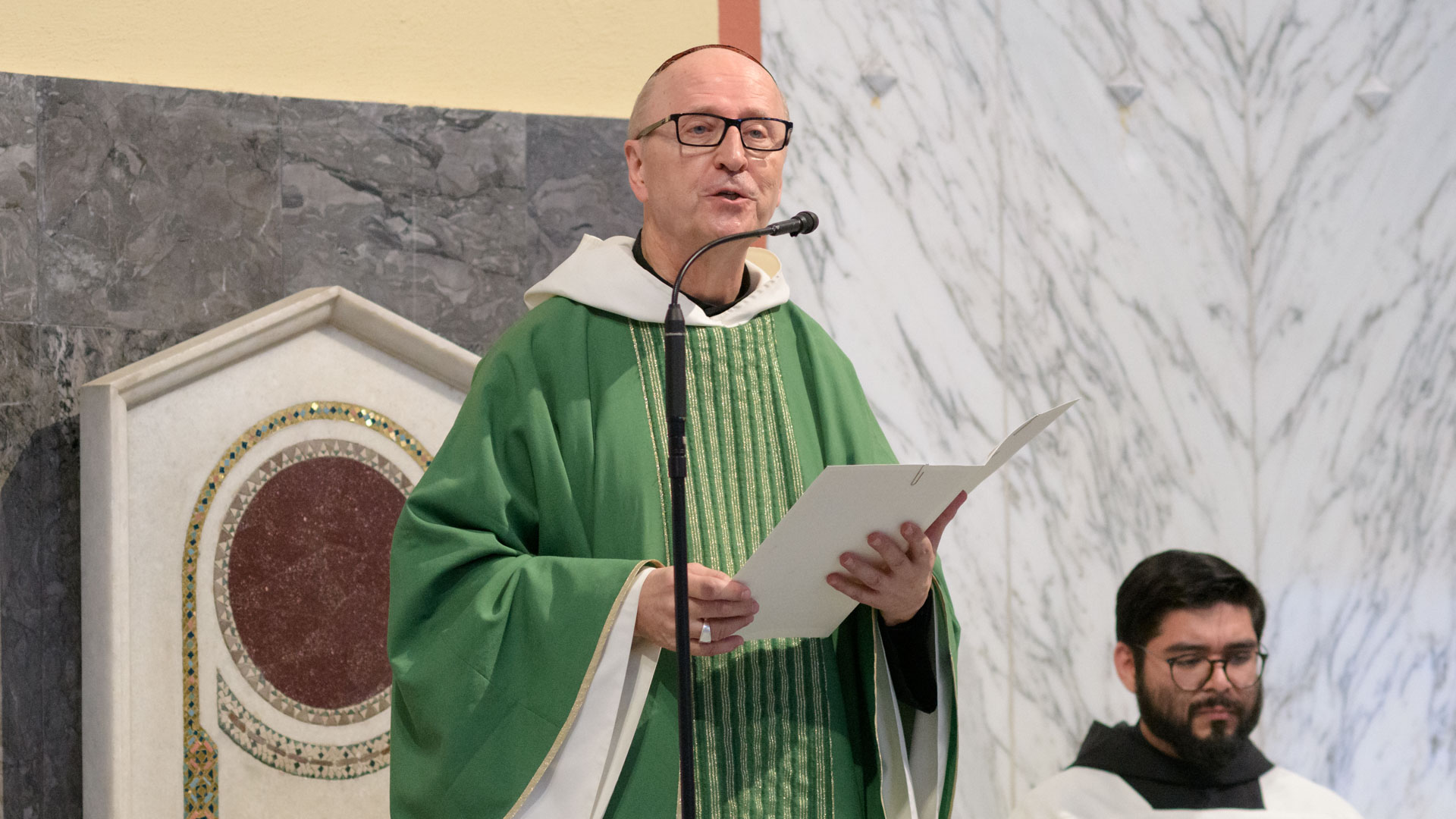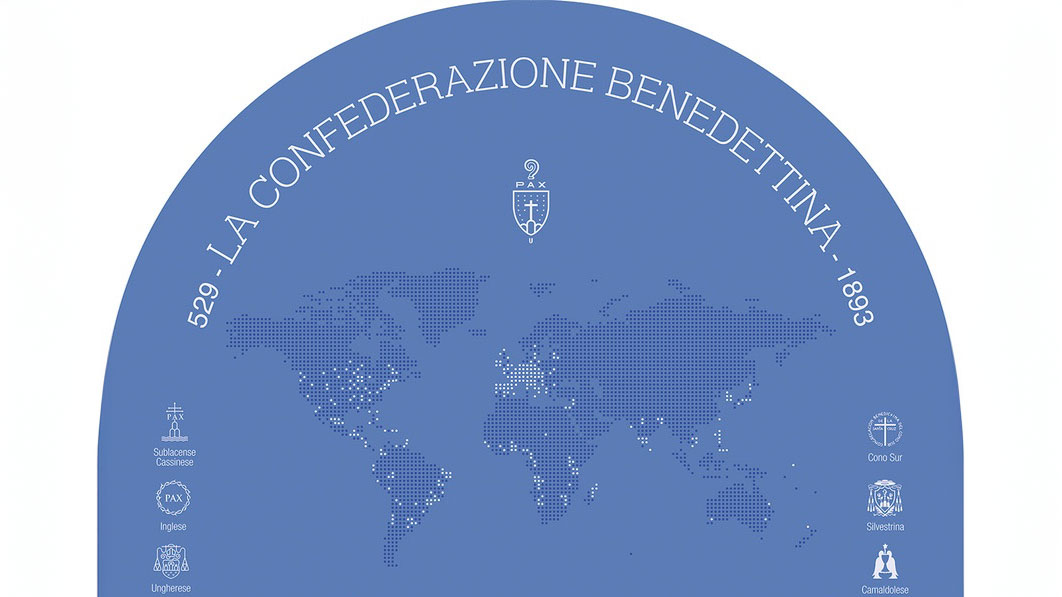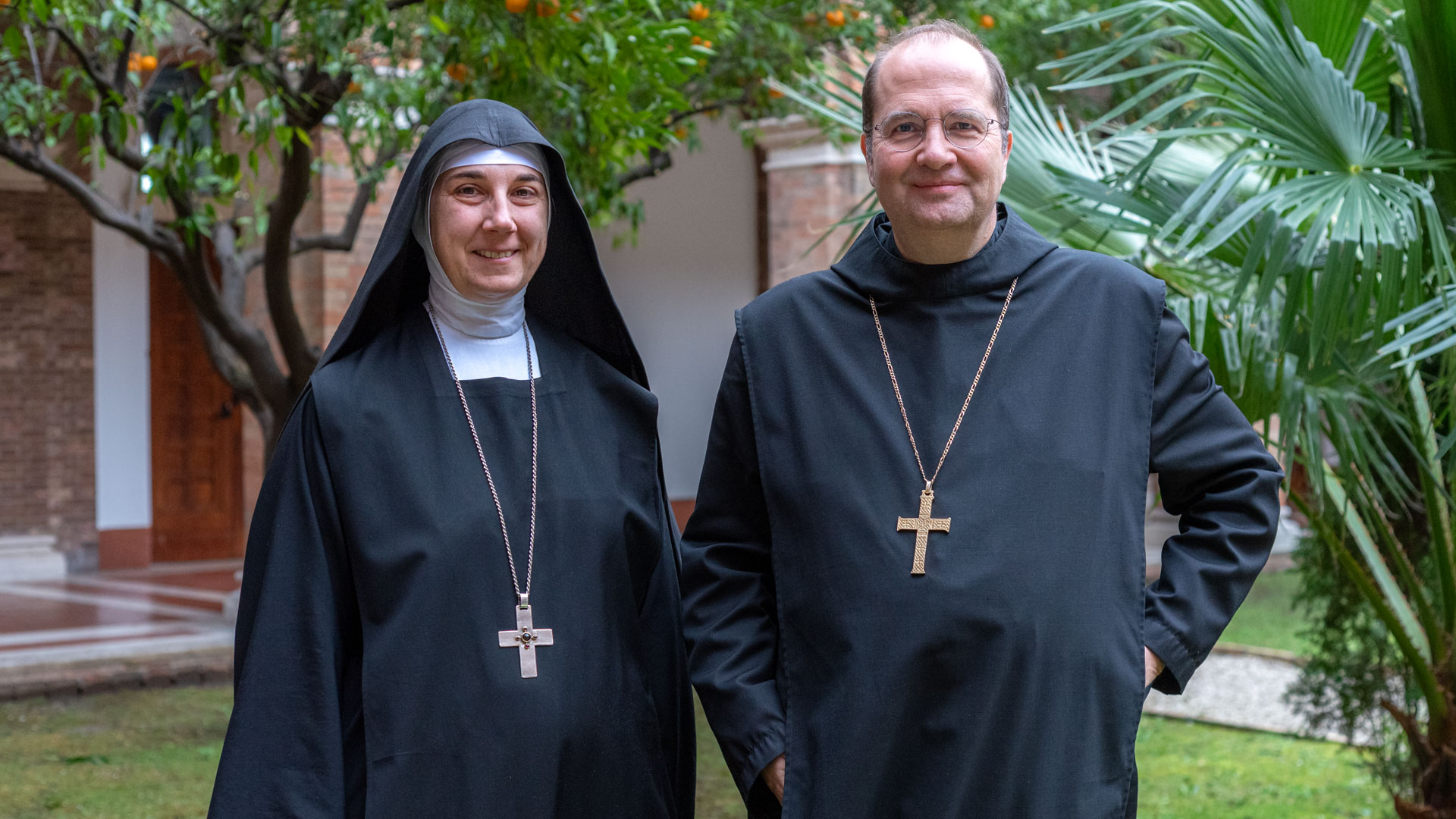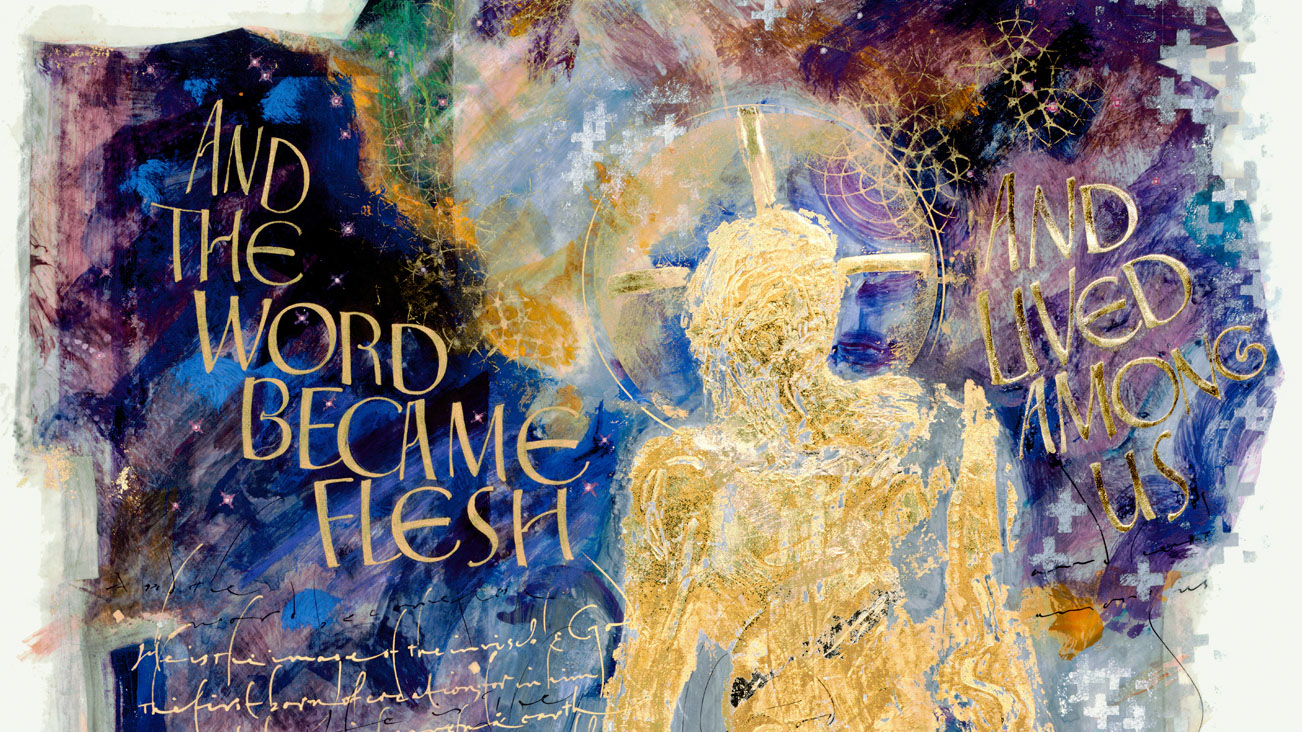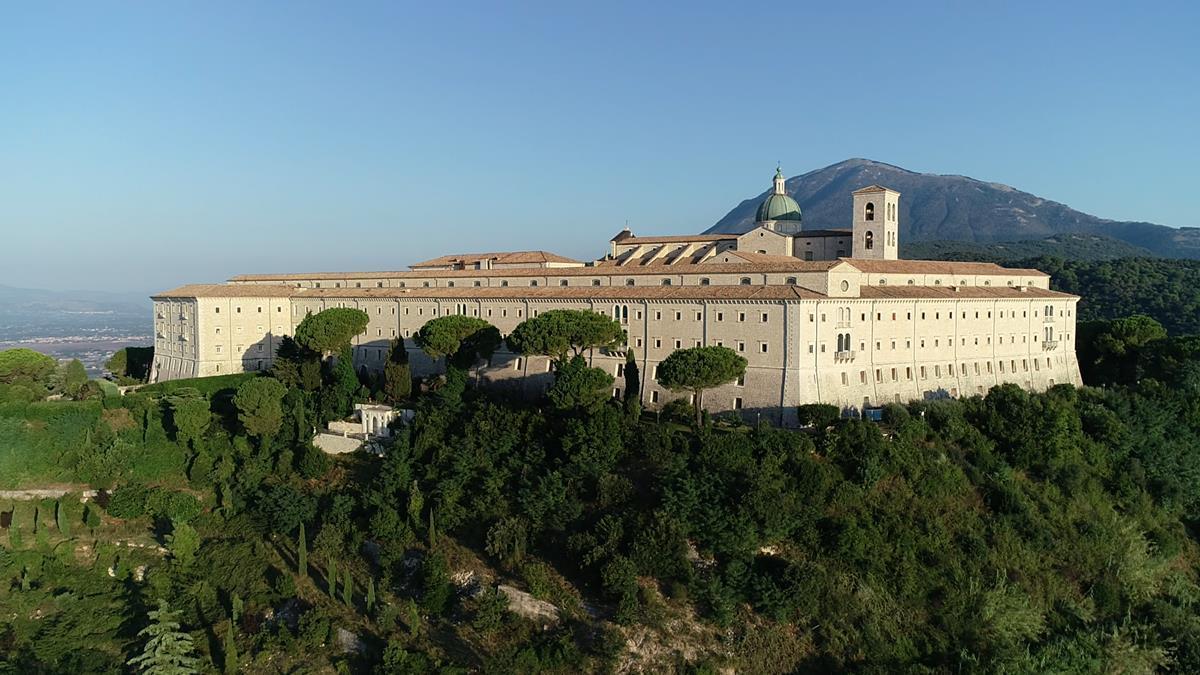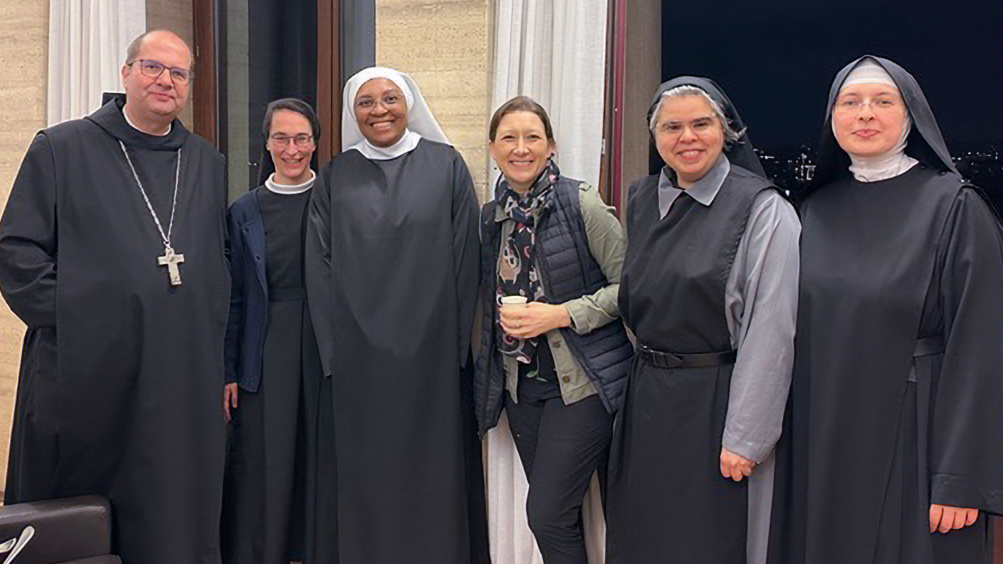Lessons from the Desert:
Abbot Gregory Polan’s Parting Insights
Abbot Primate Emeritus Gregory wrote: "For Poemen, nothing less than total dependence before God will enable us to see ourselves as we really are. If we have nothing on which to depend, upon which to feel secure, it brings us to a point of seeing ourselves stripped of the things that serve to give us a false meaning of who we are in this world."
25 March 2025
Eight years have passed since we were together as a Body of Benedictine Abbots. Many significant issues have come forward for our world, our Church, and our Benedictine Order. We have faced, and continue to face, a world divided by war, violence, death on many levels, and expressions of extremism. Similarly our Church, of which I believe we are a vital part, has passed through times of both suffering and healing, humiliation and honor, death and new life. And our Church has pointed us in new directions for the future to a rededication to Christ and the truths of the Gospel. This will ever be enriched by our ability to relate to one another in a synodal way. Very much like our Church, our Benedictine Order has struggled to face the reality of smaller communities, fewer vocations in many parts of the world, and the search for deeper wisdom to plot new directions of formation within our communities at all levels, including ourselves as abbots and senior members in our communities. Yet, when speaking about our challenges, are these not an incentive to renew our Benedictine life at all its levels? Are not our issues pathways forward to dedicate ourselves to see in our problems a plan for the continual and on-going renewal of our Benedictine Order, our mission in Christ, and our invitation to make the Benedictine spirit alive, well, and healthy? Our dedication to the simple but profound motto of “Ora et Labora” offers us plentiful ways in which we see how the Benedictine Order can move forward as a creative and hopeful leader in the Church to many ways in which we can touch our Church and our world through the things that have distinguished Benedictines through the centuries: liturgy, prayer, silence, listening, contemplation, dialogue, ecumenism. moderation, humility, obedience, and hospitality.
My intention in this morning’s conference is not to summarize the Benedictine world for you. That is the work of the members of the Synod of Abbot Presidents who have both prepared reports and short talks that we will hear interspersed through the coming days. Rather, I would like to speak more to you as a brother-abbot who has taken on the task of remaining an abbot while living and working in a unique and wonderful place here at Sant’Anselmo in Rome. What I can say, and will elaborate more tomorrow when speaking about the roles of the Abbot Primate, is that it has been so very different from my previous experience of serving as Abbot of Immaculate Conception Abbey, most often known as Conception Abbey, in the heartland of the United States. I sincerely thank you, my brother abbots, for calling me to this present responsibility at Sant’Anselmo to represent the Benedictine Order in a variety of different places throughout the world. At the same time I can say that it has tested me in both my God-given talents and in developing untapped skills that are needed for the well-being of those at Sant’Ansemo and various situations in monastic communities throughout the world. It has stretched by abilities, shown me my weaknesses, and challenged me to develop in ways that have deepened my spiritual growth, broadened my horizons, and enabled me to see how our Benedictine Order of both men and women predicts a wonderful future in ways which our service of others is drawing them to Christ through the spirit of Saint Benedict.
During these years as Abbot Primate, and living at Sant’Anselmo, I have developed a spiritual friendship with those earliest of monastic founders, the fathers and mothers of the desert. These men women went to the Palestinian and Egyptian deserts in the fourth centuries, following the Edict of Constantine. They went in search of knowing the human soul, and especially their own soul. Their solitude provided the space for a subtle rumination which opened them up in simplicity and depth, with eloquent speech and words of authority, responding to their times; and they left a legacy which still speaks to us today. Though they rarely quoted long passages from the Scriptures, they were formed by the Holy Spirit that dwelt in the divine Word of the Scriptures. The Scriptures were in their bones and blood, in their minds and their hearts. Though Constantine had given Christianity freedom of expression, these monks of the desert were in search of a freedom which opened their eyes to see more deeply, their ears to hear more profoundly, and their hearts to receive more openly on how the Holy Spirit would prompt them on matters for their more serious reflection. Their flight to the desert was to enter into that place of their ancestors in the faith where God spoke to their heart in an undivided and transformative way that brought about a true conversion of heart. Hosea’s prophecy was their inspiration: “I will allure her now; I will lead her into the desert and speak persuasively to her heart” (2:16). As their numbers grew, there were new and younger seekers who came with questions for seeking the way to God’s will. Their questions and stories reveal to us the intensity of wisdom which human experience and suffering would teach them.
There are many fine collections of writings that collect the sayings of our Desert Ancestors. One in particular was helpful to point out key themes which recur numerous times through their writings. It is Burton-Christie’s The Word in the Desert. Reading through the desert tradition is almost like reading the Book of Proverbs. The short and pithy sayings force us to stop and consider what the author is trying to share with us. But I don’t think that a surface reading of these texts is sufficient. We can become easily bored and give up the task of a slow and careful reading of these sayings, likened to the spiritual task of lectio divina. It is the close, slow, and deep reading of Scriptural texts the continue to form us,our hearts and our mind. I would like to consider four of these key points: 1) the importance of self-knowledge; 2) the importance of patience; 3) a deep knowledge of the Psalms, and 4) spiritual paternity and fraternal love. These are words from an ancient monastic tradition that speak in a style very different from our own, yet they have something to say today, and also to those who make up our monastic communities.
The Importance of Self Knowledge
Abbot Poemen says that the text from Ps 55(54):23 is essential for both the monk and the spiritual father: “Entrust your cares to the Lord, and he will support you. He will never allow the just one to stumble.” Abbot Poem takes that verse of the psalm and alters it to read: “to throw yourself before God; cast yourself and your cares before God.” For Poemen, nothing less than total dependence before God will enable us to see ourselves as we really are. If we have nothing on which to depend, upon which to feel secure, it brings us to a point of seeing ourselves stripped of the things that serve to give us a false meaning of who we are in this world. This is the self-knowledge that comes with being utterly vulnerable before God. The ways that the desert tradition treats the importance of self-knowledge is that it confirms it as something that keeps popping up in our life. Once we think we have come to that point of an acknowledgement of who we are, what is unique about us (both positive and negative), what weaknesses distinguish us, we come to the realization of how it is that this practice of “casting ourselves and our concerns upon the Lord” is a life-long process. Every day, there are the occasions when our uniqueness before God gets in the way of our living with the inner freedom that distinguishes the monk, the abbot.
Yet, total reliance upon God strengthens us to see with an inner freedom that enables us to judge rightly. That is not always easy. However, it is very liberating when we come before an issue that demands our careful insight, and inner freedom shows us the path to follow. When there is true self-knowledge, one sees more clearly how to judge what is right or wrong, profitable or unprofitable. When we have stood alone before God, without the help of any person or thought, there is the realization of who we are with a freedom to see life and all its complexities with a vision that is sure, confident, and upright or just. This does not happen overnight. The realization of inner freedom comes with years of seeing life through this perspective of my own utter dependance upon God, while at the same time living with the Holy Spirit as my guide.
In practice, a situation arises which has a certain significance about it because it involves one’s life, especially the life of another in need, a human soul. Yet, when you possess this self-knowledge and inner freedom, it is clear to you which way you must decide, and you do it. It is not necessarily easy, but it is firm within you because of the inner freedom you have received by the grace of God and your openness to the voice of the Holy Spirit. The old adage, “To yourself, be true,” bespeaks this self-knowledge and inner freedom.
The Importance of Patience
So often today, as life moves so quickly and we expect immediate results, we find ourselves at different levels of frustration. Growing up, I can remember my mother saying to me, “Remember, patience is a virtue.” Yet I have come to see how essential it is for all in our world today to grow in this virtue. Too often, we rely solely on the human efforts of one another to accomplish things. And yet, for us as abbots and spiritual fathers of communities, the work of molding human hearts is something to which we must give prayer, reflection, and patience, because it is God who molds and fashions human hearts in a way far more wonderful than anything we could do ourselves. And often, the great wisdom of God has something far deeper and more significant than we can try to fashion. But we have to wait, and in that waiting, we have to be patient for God to accomplish with grace something far more significant than we could have ever imagined. Patience will consistently show us this truth of the Christian life.
Let’s hear something from the desert tradition that speaks to this. “When the holy Abbot Anthony was living in the desert, his soul fell into a weariness and confusion of thought, and he began saying to God, ‘Lord, how I wish to be made whole and my thoughts would not cause me to suffer so much. What shall I do in this tribulation, how shall I be made whole?’ A little while later, rising up, he began to walk out into the open, and he saw someone. At first, he thought it was himself sitting and working, and then rising from this work and praying; and again sitting down and making a crown of palm leaves, and then rising once again to prayer. Now, in truth, this was an angel of the Lord sent to Anthony as a reproof and a warning. Soon after this he heard a voice which said to him, ‘Do this, and you will be made whole: Be patient.” Upon hearing these words, Abbot Anthony took great joy and courage in this admonition. And in doing so, he found the deliverance for his soul for which he sought and prayed.”
Our willingness to be patient has an effect on both the one who is the recipient and also on us. For the one who receives our patience there is the blessing in knowing that he or she has been respected by not rushing to resolve some issue. Giving time to allow thoughts, feelings and reactions to settle, demonstrates to the other person that this issue is not a game of power, to see who will win. Rather, patience reveals that our willingness to give the issue time to determine the proper direction forward, is grace at work in us. Our patience can serve as a teacher to a member of the community for any future situation in his or her life. Patience can enable a bond of communion between two people – once disagreeing on a matter, and eventually coming to a common vision of resolution.
And so in our willingness to be patient there are so many blessings that come. First of all, we acknowledge deep within our hearts that this is a matter for God’s grace to work its miracle of conversion. And that makes us an instrument of God’s workings; that should give us a sense of great worth: being an instrument of God. Secondly, each time we can place in God’s hands the care of our brothers, or sisters in community, and wait patiently for something to stir him into the perfect path prepared by God. Thirdly, sometimes we discover that our well-meaning plan for someone is not the plan of God for that brother or sister. Or that our hoped-for plan is still being worked out in the mystery of grace in divine time and not in human time. Fourthly, patience, when practiced time and time again, calms our soul and gives us the peace that makes a different in the way that we approach people in general, and also the way that they come to see us. A more peaceful, tranquil, and thoughtful abbot is always someone who is easier to approach, and someone to whom we are ready to open our heart. And fifthly, and maybe most importantly, in practicing patience, we imitate God, whose unending patience with each of us is one of life’s greatest blessings. When we can think back on those times when God has waited for us to be patient, to be open, to be ready to listen to his divine voice, we see how blessed we have been. And we are grateful.
A Deep Knowledge of the Psalms
The psalms are our daily companions. We encounter them 3, 4, or 5 times a day, depending on the arrangement of the psalms in your celebration of the Liturgy of the Hours. Some communities recite all 150 psalms in a week; most communities recite 150 psalms over two weeks, and some smaller communities over 3 or 4 weeks, depending on their number of monks. We remember that these prayers have been translated from their original Hebrew settings into Greek, Latin, Syriac and Aramaic. Most of the psalms can be found among the fragments of the Dead Sea Scrolls. This collection of prayers has been recited and used as a source of prayer for over 2,500 years in both worship and private prayer. Scholars who study the desert tradition note that it is the New Testament that is most often reflected on or quoted in the desert tradition. However, when the Old Testament is quoted by the desert fathers and mothers, it is consistently from the psalms. And it is interesting to note that when the psalms are quoted, it is often one line that is repeated numerous times or rephrased as coming from their prayer. This was while they are weaving their baskets or braiding their ropes.
We don’t often think about doing lectio divina or meditating on the psalms, and yet that is what lies at the heart of the recitation of the psalms in the Liturgy of the Hours and the desert tradition. The General Instruction for the Liturgy of the Hours clearly states a distinction between the “recitation of the psalms,” and our “prayer from the psalms.” In the early editions of the Liturgy of the Hours after the Second Vatican Council, there were inserted brief collects to accompany the psalms. Sometimes they were recited, sometimes prayed silently, and sometimes ignored. But the point was that the tradition of praying from the texts of the psalms goes back to the early tradition of our communal prayer. The question for us is, “how do the texts of those psalms call forth prayer from our hearts; how do the words of the psalm spark a fire within us that calls out to God in prayer of the heart?
I mention this because we can sometimes move through the recitation of the psalms without any pause which would encourage prayer or reflection. As much as any book of the Bible, the psalms are also the inspired word of God. God speaks to us through those words and calls forth a response from us. In recent years, the study of the psalms has pointed out that the very first psalm of the psalter is a torah psalm, a psalm of instruction. Is that psalm suggesting that the whole book of psalms is more than a collection of prayers, and also a guide to righteous and just living, in such contrast to the violence and war which pervade our world today, and are the psalms that speak of violence, enemies, and hatred, calling us to pray for that need and intention for our world, for our brothers and sisters in the human family in desperate situations? I can tell you, from the days of my novitiate, the Psalter has been a constant companion for prayer and reflection. It brings together a multitude of different types of prayers where our hearts are turned to life’s struggles with enemies, the violence of war, as well as profound and deep praise and grateful thanksgiving. I cannot encourage enough a deep understanding of the wealth that we find in the Psalter for our daily living, our daily prayer, and our daily reflection on the movements in our world today. Get to know and love the Psalter, my good brothers and sisters. Encourage it among your brothers and sisters in community, and those who come among us for prayer, retreat, and silence!
Spiritual Paternity and Fraternal Love
In reading the Rule of Saint Benedict, the role of the abbot as spiritual father stands as the most pronounced image of the one who leads the community. “Everything [the abbot] teaches and commands should, like the leaven of divine justice, permeate the mind of his [sons]” (Rb 2:5); The abbot is to show equal love to everyone and apply the same discipline to all according to their merits (RB 2:22); The abbot must always remember what he is and remember what he is called – father (RB 2:30).” There are so many other references to the spiritual paternity of the abbot, and you all know them well. And yet, there are some dangers with the title of spiritual paternity. If it is exercised too strongly, the monks are made to feel like children, people without responsibility, initiative and intelligence. If emphasized too strongly, it can create an atmosphere of immaturity which has negative effects on the growth and vitality of the community. And yet, when there is a strong sense of having a spiritual father at the head of the community, there is the expectation of good will in the community, a desire for well-being of all, and a sense of direction for the future. Everyone needs to know there is someone whose life and vision is focused on the life of the community
One of the ways in which spiritual paternity creates a healthy balance is through a sense of fraternal love coming from the abbot. Again, let us hear from the desert tradition to give us some perspective. “At one time, Abbot John was climbing up from Scete with a number of the brethren. And the monk who was guiding them mistook the way, for it was night. Some of the brethren said to Abbot John, ‘What shall we do, Father, for our brother has missed the way, and we may lose ourselves in the dark, and even die on these uneven paths.?’ And Abbot John said, “If we say something negative to him, he will feel badly and discouraged. But I shall make a show of being worn out and say that I cannot walk any further, but must lie down here until the morning comes.” And he did so. And the other brother said, ‘Neither shall we go on, but shall sit down beside you.’ And they sat down until morning, so as not to discourage or hurt their brother.” There, the example of the abbot spoke loudly to his sons, and they followed his example. They saw the love of their spiritual father, and they wished to follow his example.
A love for the brethren is so very important. Each monk needs to know two things: first, that he is loved and cared for, and also that he has a spiritual father in the person of the abbot of the community. The difference that this makes in the life of the community is so tangible and distinct, that you know this community lives with a fraternal love that flows from relationship with the spiritual father. The word love is not always a comfortable term for men. Some will use terms to describe love as being supportive, encouraging, caring, sympathetic, kind, understanding and compassionate. This is true and can be helpful, but we must not lose a true sense of the word love because the Scriptures remind us that “God is love, and the one who abides in love, abides in God” (1 Jn 4:16b). And St. Paul tells us in his letter to the Romans, “The love of God has been poured out into our hearts through the Holy Spirit that has been given to us” (5:5). We know also from the Scriptures that the love which Jesus demanded of his disciples was not always an easy encounter. Sometimes, to truly love one of your brothers or sisters, you have to discipline the person, make a change in his or her life which will not be an easy adjustment, yet if it is done in love, it carries a significant weight. When a monk knows that his abbot loves and cares for him, that he is willing to sacrifice for him, and even when he has to make a change for the sake of someone else, if there is fraternal love, there is also a communion of spirits which bespeaks the love of God which is present there.
Something that is very practical and has been important for me is prayer for the brethren. Here I am not talking about seeing a need and remembering it in your intentions, which is important. But even more, first as Abbot of Conception Abbey, and now as Abbot at Sant’Anselmo is that I have prayed for each monk in my community by name, each day. And I might say that, for my home community, it still continues for the monks of Conception Abbey. I would like to believe that is why I feel so happy about returning home after 8 years in Rome. Yes indeed, I have loved Rome; I have made some wonderful friends here, there have been so many enriching experiences. I have so appreciated visiting the communities of Benedictine men and women, and yet I know the place and the people where I have loved deeply and am loved, and I know where my home is, and I look forward to returning there to take up the next Chapter of my monastic life.
In many ways these four ideas – growing in self-knowledge, exhibiting the virtue of patience, finding a home in the psalms, and bringing love to your service as abbot or abbess – are simple yet distinctive, not only of Saint Benedict, but also of Jesus as exhibited in the Gospels. We are entrusted with human souls – men and women with high ideals and also fragile personalities and abilities. When our relationship with each of the members of our community grows into an experience of communion, a monastic community exhibits a vibrancy which can only come from the grace of God at work in it. When we are willing to walk the rough road with another, and even when we are unsure of the next step, we are carrying out the work of the Rule and the Gospel. While it seems so utterly simple, it is also so profoundly deep in building up the kingdom of God within our monastic communities.
Before finishing this talk, there are some people whom I would like to publicly acknowledge for their assistance and encouragement to me during these past eight years. The Prior of Sant’Anselmo, Father Mauritius Wilde of Münsterschwarzach, has been here with me for the last 8 years. I thank him for the generous use of his skills and talents in organizing the life of the collegio. When I am away from Sant’Anselmo, I feel confident that the care of the monks, living and studying here, are in good hands. I thank also the Subprior, Father Fernando Rivas of the Abbey of Lujan in Argentina for his generous service both in the collegio and in the Ateneo. He has multiplied the programs of monastic formation in a variety of languages to Benedictines and Cistercians throughout the world. I thank the Rector of the Ateneo, Father Bernhard Eckerstorfer of the Abbey of Kremsmünster in Austria for his creative genius in moving our university forward and forming a strong community among the faculty and students. I thank Father Geraldo Lima y Gonzalez for his work in the Treasury and his work as Procurator of several of our Congregations. Father Geraldo is one of the most generous individuals who applies his talents wherever they are needed. Father Rafael Arcanjo who also works in the Business Office and supervises our volunteers, who help keep life moving forward here. Mr. Fabio Corcione as the supervisor of our Business Office. Our guests are well cared for by Father Benoît Allogia of St. Vincent Archabbey and Brother Victor Ugbeide of Ewu in Nigeria.
The care of the house as curator domus is ably supervised by Father Josep Maria Sanroma of Montserrat, who is also secretary to the Prior. Father Laurentius Eschelböch, who serves as our Canonist and Professor, has been most generous in his time and energy in helping with the canonical problems that arrive at the Primate’s desk. My personal secretary in the curia, Mr. Walter Del Gaiso, has been nothing short of exceptional in all his endeavors. He works with care, generosity, and speed to put in a full day’s labors, day after day. And as you know, “a good kitchen keeps a healthy house,” so I sincerely thank Antonio Giovinazzo and his team in the kitchen, of which we are the happy recipients these days. It is important to offer a word of thanks to Sister Lynn McKenzie the Moderator of the CIB; our communications and work together have been a sign of the importance of the collaboration between men and women Benedictines. And the final word here goes to the abbots who have allowed these monks to be here at Sant’Anselmo as professors and officials. These are talented men who are certainly missed in their home communities because of the gifts and talents which they generously share with this community of Sant’Anselmo. To you, dear brother-abbots, I offer a sincere word of thanks and deep gratitude. Sant’Anselmo lives and breathes new life because of your generosity and self-sacrifice.
“Let us all prefer nothing whatever to Christ, and may he bring us all together to everlasting life. Amen” (RB 72:11).

